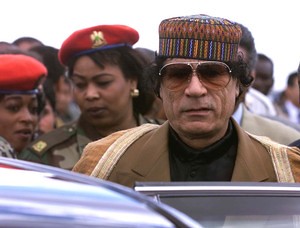
Libyan leader Muammar Gaddafi is fighting against an imperialist onslaught against his North African state. Gaddafi is a former chairman of the African Union and is an advocate for a unitary pan-african state on the continent., a photo by Pan-African News Wire File Photos on Flickr.
June 18, 2011
NATO Says It Mistakenly Hit Libyan Rebels Again
By DAVID D. KIRKPATRICK
New York Times
TRIPOLI, Libya — NATO acknowledged Saturday that its aircraft had mistakenly hit a column of rebel military vehicles last week near the Libyan oil port of Brega in at least the third such episode since the airstrikes began three months ago.
The number of casualties could not be determined. “We regret any possible loss of life or injuries caused by this unfortunate incident,” NATO said in a statement.
The accidental strike, which occurred Thursday, took place against a backdrop of blurry battle lines as the rebels challenging Col. Muammar el-Qaddafi pushed against his forces near Brega in the east, outside Zlitan in the midcoast, and in the Nafusa Mountains to the west. The fighting on each of the three fronts has been mired in a fluid back-and-forth without much movement for about five days, and Qaddafi forces have been using civilian vehicles like pickup trucks, just as the rebels do, in an apparent effort to confuse NATO.
In this case, NATO said in its statement, its surveillance had spotted the column of military vehicles, which included tanks, in an area where Qaddafi forces “had recently been operating.” The statement added, “In a particularly complex and fluid battle scenario, it was assessed these vehicles were a threat to civilians.”
In early April, NATO admitted its warplanes twice hit rebel positions, killing more than a dozen men.
Around the same time as Thursday’s mistaken strike, rebels based in the city of Misurata were complaining that NATO had been telling their fighters to hold back from the battlefront near Zlitan to avoid getting caught in attacks on Qaddafi forces there. The rebels said NATO had failed to deliver the promised attacks and in the process slowed the rebel advance.
“If it wasn’t for NATO, we could have moved the combat line much further from Misurata,” said Mohamed, a rebel spokesman, though it is far from clear that the rebels could have held their ground without NATO support. The spokesman’s full name was withheld to protect his family.
Both NATO and the Qaddafi government, meanwhile, have recently stepped up their efforts to accuse each other of recklessly endangering civilians. In a press conference in Brussels, NATO officials showed a film clip that appeared to show Qaddafi forces firing missiles from inside a mosque into a residential area during fighting in a Nafusa Mountain town.
Qaddafi government officials, for their part, showed foreign journalists a partially collapsed building of classrooms housing the geography department at a university here, saying that NATO had begun striking campuses in its attempt to terrorize the population. The campus is near a military facility, but whether the damage was caused by a NATO airstrike could not be confirmed. No one was hurt in the strike.
Several students fluent in English and waiting by the collapsed building denounced NATO’s attacks. “The future with Muammar Qaddafi is perfect,” said Aya Suessi, 19.
Around the corner, however, a group of about a dozen male students praised the airstrikes.
One of the young men said most students did not support Qaddafi. “The ones who are for Qaddafi can do or say whatever they like,” he said. “We can’t say anything or they will kill us.”
1 comment:
Tell them to pay for thei
r own education like they do in US and in UK
Post a Comment